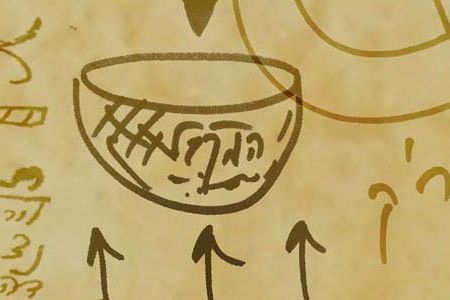Genesis, 28:10-32:3
This Week’s Torah Portion | November 15 – November 21, 2015 – 3 Kislev – 9 Kislev, 5776
In A Nutshell
The portion, VaYetze (And Jacob Went Out), begins with Jacob leaving Beer Sheba and heading for Haran. He stops for the night and in his dream he sees a ladder “set up on the earth, with its top reaching to heaven; and behold the angels of God ascending and descending on it” (Genesis, 28:12). The Creator appears before him and promises him that the earth on which he is lying will be his, that he will have many sons, and that He will watch over him. The next morning, Jacob sets up a monument in that place and calls it, Beit El (House of God).
Jacob comes to a well near Haran, where he meets Rachel and her father, Laban the Aramean, who offers him to work for him for seven years in return for permission to marry Rachel. At the end of the seven years Laban deceives Jacob and gives him Leah instead. He compels Jacob to work for him seven more years, after which he gives him Rachel and Jacob marries her.
Leah has four sons from Jacob, while Rachel is barren. Rachel gives to Jacob her maidens, who give birth to four more of his sons. Leah delivers two more sons, until finally Rachel conceives and gives birth to Joseph.
Jacob asks Laban to pay for his work. Laban gives him some of the flock, although they had a different agreement. Jacob shows the flock the troughs, and they conceive and deliver. Some of the lambs are born striped, some are speckled, and some are spotted.
Jacob feels that Laban is not treating him as before. At the same time, an angel appears before Jacob and tells him to return to the land of Israel. He leaves without notifying Laban, and Rachel steals the idols. Laban chases them in search of the idols, catches up with Jacob on Mount Gilead, and rebukes him for fleeing and stealing the idols.
Finally, they make a covenant on the mountain. Jacob is preparing to enter the land of Israel, he sees angels accompanying him, and he calls the place, Mahanaim (two camps).
Commentary by Dr. Michael Laitman
Kabbalah always interprets stories as stages in a person’s inner growth, according to man’s purpose in this world—to discover the Creator, to achieve His degree, meaning to achieve Dvekut (adhesion).
Thus far, all the portions related to man’s initial point, Abraham, which is scrutinized through study, the group, connection with the teacher, and the books of Kabbalah. Subsequently, a person discovers the next stage, Isaac, followed by Ishmael, and then by Esau.
The portion, VaYetze (And Jacob Went Out), speaks of Jacob, who is the middle line. Abraham is the right line, and Isaac is the left line. Jacob is special in that the middle line contains all the qualities, the good, as well as the bad. In the middle line, the evil inclination and the good inclination merge in order to achieve the degree of the Creator, our goal.
The work in the middle line is done entirely in faith above reason, in bestowal, above the ego. This is the quality of Jacob in a person, and this is how it develops. Jacob leaves Beer Sheba, meaning a certain place, an inner state, and heads for Haran, which is another stage along the way. On the way there he must shift from state to state through the day and the night. In other words, Jacob experiences internal, spiritual ascents and descents.
Continue reading “VaYetze (And Jacob Went Out) Parsha – Weekly Torah Portion”

